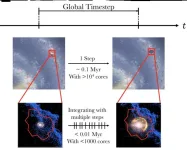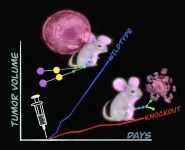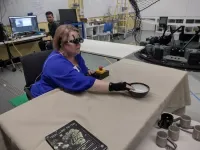(Press-News.org) A team led by Nagoya University Graduate School of Medicine in Japan has investigated screen time in autistic (ASD) and ADHD children. Screen time refers to the amount of time a person spends on a device with a screen, such as a smartphone, computer, television, or video game system. The researchers found that children with a genetic predisposition to ASD were more likely to use screens for longer periods. Meanwhile, children with ADHD gradually increased their screen time as they grew older, even if their initial screen use time was short. They published their results in the journal Psychiatry Research.
People are increasingly spending their time looking at the screens of their digital devices. This is especially true for children with neurodevelopmental disorders who tend to use screens for longer periods.
Recognizing this issue, researchers from Nagoya University and Hamamatsu University examined 6.5 million polymorphisms in 437 children’s DNA to determine genetic susceptibility to ASD and ADHD. Next, they calculated a genetic risk index that considers the number and size of the effects of changes in genes associated with ASD/ADHD. This is known as a "polygenic risk score”. The researchers then compared it with the amount of time spent using screens devices among a sample of children aged 18, 32, and 40 months.
They found that children with a higher genetic susceptibility to ASD used devices with screens longer (3 hours a day or 4+ hours a day) from early childhood. They also found that kids with a high genetic risk of ADHD gradually increased their screen time as they grew older.
The lead researcher, Dr. Nagahide Takahashi of Nagoya University, explained: “Overall, those with a genetic risk of ASD were 1.5 times more likely to be in the group with about three hours of screen time per day, and 2.1 times more likely to be in the group with more than four hours of screen time.”
“While long periods of screen time in childhood have been suggested to be a cause of ASD/ADHD, the results of this study suggest that some people may have a genetic disposition to use screens because of ASD,” he said. “Screen time may be an early sign of ASD, rather than a cause, as children with ASD are often more attracted to objects than people. Physicians should know that it is not fair to conclude that prolonged screen time is a risk factor for the development of ASD.”
Takahashi also cautions against overexposing children with ADHD to device screens. “Our results suggest that children at risk of ADHD are at risk of having too much screen time, especially since gaming addiction is common. As screen time tends to be longer for children who are particularly susceptible to ADHD, parents and caregivers should be cautious about it and make a commitment before it becomes a problem.”
These results may also help parents devise better child-rearing strategies. “Parents of children with neurodevelopmental disorders may feel guilty or be criticized by others for allowing their children screen time,” Takahashi said. “However, we would recommend offering help to caregivers including offering alternative behavioral management strategies.”
END
Genetic risks of autism and ADHD may be related to more screen time in children
2023-10-26
ELSE PRESS RELEASES FROM THIS DATE:
Deep learning speeds up galactic calculations
2023-10-26
Supernovae, exploding stars, play a critical role in the formation and evolution of galaxies. However, key aspects of them are notoriously difficult to simulate accurately in reasonably short amounts of time. For the first time, a team of researchers, including those from The University of Tokyo, apply deep learning to the problem of supernova simulation. Their approach can speed up the simulation of supernovae, and therefore of galaxy formation and evolution as well. These simulations include the evolution of the chemistry which led to life.
When you hear about deep learning, you might think of the latest app that sprung up ...
Cancer's sweet Achilles heel
2023-10-26
Kyoto, Japan -- An old campaign slogan for cough syrup, "It tastes awful. And it works," seemed to imply that any sweet content might have diminished the medicinal effect.
Sweetness, in the case of cancer, appears as a chain of sugar molecules attached to proteins by beta1,4-galactosyltransferase-3, or B4GALT3 According to the Cancer Genome Atlas, a high expression of this enzyme is associated with noticeably shortened survival rates in several types of immunotherapy cancers, such as neuroblastoma, ...
Brain implant at OHSU successfully controls both seizures and OCD
2023-10-26
A patient at Oregon Health & Science University is the first in the world to benefit from a single stimulator implanted in the brain to effectively control two life-altering conditions: seizures caused by epilepsy and compulsive behavior caused by obsessive-compulsive disorder, or OCD.
Amber Pearson, 34, of Albany, said her seizures are under better control, but the relief from her psychiatric condition is profound.
“OCD is worse than having the seizures,” she said. “Epilepsy brings limitations to my life, but OCD controlled it.”
In the case study, published in the journal Neuron, co-authors from institutions across the ...
Brain injury expert says important changes still needed to law defining death despite reform pause
2023-10-26
After surveying the views expressed by 41 advocacy, medical, and transplant-focused organizations on the Uniform Determination of Death Act, a brain injury expert is calling for much-needed reforms to the legal definition of death in the United States. The recently announced pause by the Uniform Law Commission, which is spearheading revisions, is disappointing, the expert notes, but should not permanently stall practical fixes to longstanding problems with the Death Act.
“This study shows that most medical ...
Study examines racial differences in care among older Americans
2023-10-26
Older Black Americans are more likely to receive low value acute diagnostic tests than older White Americans, while older White Americans were more likely to receive low value screening tests and treatments, finds a study published by The BMJ today.
Low value care refers to services that provide little to no benefit yet have potential for harm, which can include laboratory tests, scans, and medication.
These differences were generally modest and were largely driven by differential treatment within health systems. But the researchers say the results “highlight ...
Industry payments to physicians linked to use of some non-recommended and low value drugs among cancer patients
2023-10-26
Patients with cancer whose oncologist receives payments from industry appear more likely to receive some non-recommended and low value treatments, finds a US study published by The BMJ today.
This finding raises potential concerns about quality of care, and the researchers say it may be appropriate to re-examine the current status of personal payments from the drug industry to physicians.
Research shows a consistent link between industry payments and prescribing behaviour, but whether payments to physicians have positive or negative consequences for patient care has not been evaluated empirically, say the ...
Hospitals accused of using foreign doctors as “cheap labour” in fellowship schemes
2023-10-26
English hospital trusts have been accused of using foreign doctors as “cheap labour” as part of fellowship schemes in which they can be paid less than trust-employed doctors and sent home if they become pregnant, an investigation by The BMJ has found.
Foreign doctors come to English hospital trusts as “fellows” as part of the Academy of Medical Royal Colleges’ Medical Training Initiative (MTI) scheme, explains investigations editor, Madlen Davies.
They work for two years in the NHS to gain experience that they will take back to their home countries afterwards. A proportion of fellows are sponsored, for example by their ...
Time to treat the climate and nature crisis as one indivisible global health emergency
2023-10-26
Over 200 health journals across the world have come together to simultaneously publish an editorial calling on world leaders and health professionals to recognise that climate change and biodiversity loss are one indivisible crisis and must be tackled together to preserve health and avoid catastrophe.
The authors say it’s a “dangerous mistake” to respond to the climate crisis and the nature crisis as if they were separate challenges, and urge the World Health Organization to declare this indivisible crisis as a global health emergency.
The editorial is published in leading titles from around ...
Vision via sound for the blind
2023-10-26
ustralian researchers have developed cutting-edge technology known as “acoustic touch” that helps people ‘see’ using sound. The technology has the potential to transform the lives of those who are blind or have low vision.
Around 39 million people worldwide are blind, according to the World Health Organisation, and an additional 246 million people live with low vision, impacting their ability to participate in everyday life activities.
The next generation smart glasses, which translate visual information into distinct sound icons, were developed by researchers from the University of Technology Sydney and the University of Sydney, ...
New study reveals inequities in access to mechanical circulatory support in US patients with cardiogenic shock
2023-10-26
SAN FRANCISCO – A new study presented today at TCT 2023 sought to evaluate the presence of racial, ethnic, and socioeconomic inequities in access to mechanical circulatory support in the United States among patients with cardiogenic shock (CS). The findings, published in the Journal of the Society for Cardiovascular Angiography & Interventions (JSCAI), revealed stark disparities, particularly among Black patients, that further highlight systemic inequities in access to lifesaving therapies.
CS is a life-threatening condition in which your heart suddenly cannot pump enough blood to meet the body’s needs. As a result, your ...


